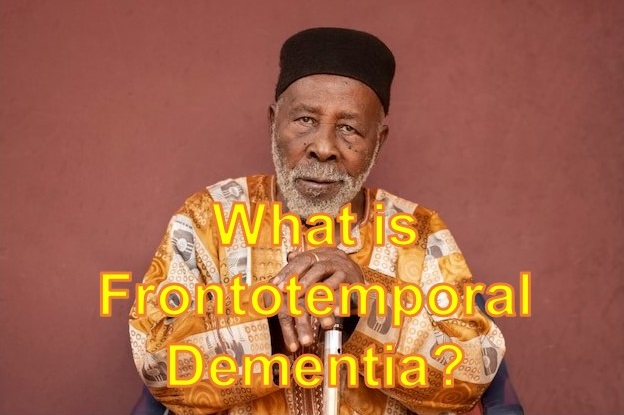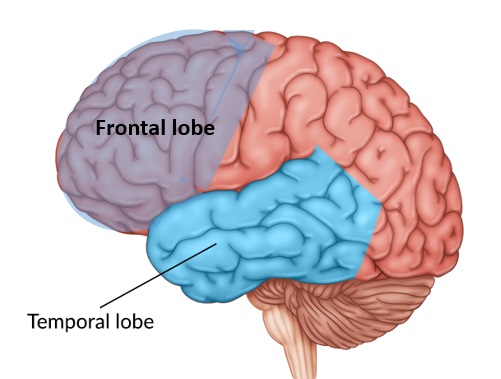FTD Explained to Africans: Causes and Types I Symptoms and Diagnosis I Treatment
Frontotemporal Dementia Explained to Africans: Causes and Types
By Oluwasola Samuel, Freelance health writer. Medically reviewed by: A. Odutola MB.BS, PhD, FRCSEd.

Portrait of an elderly African man dressed in cultural attire with a black skull cap and sitting with both hand on a cane, against a brown background. In the foreground are the words of a caption: What is Frontotemporal Dementia in yellow colour framed in red outline. Image credit: Freepik.
Imagine having to admit one day that the person you’ve known all your life (your parent, partner, sibling, or friend) is acting like a completely different person. They say strange things, forget simple words, or behave in ways that don’t make sense. This isn’t just a mood swing or normal ageing; it could be frontotemporal dementia (FTD).
This is the silent reality of frontotemporal dementia (FTD), a rare but complex brain disease that many people in Africa have never heard of, yet it’s changing many lives everyday worldwide.
FTD affects a person's personality, speech, and behaviour, unlike Alzheimer’s, which mainly affects the memory. This condition can lead to posture problems, which increase your risk of falling. It often affects middle-aged people. [1]
In this article, you will learn about frontotemporal dementia from these viewpoints:

Fig. 1: Image of the left side of the brain showing the areas most affected by frontotemporal dementa, frontal and temporal lobes
Frontotemporal dementia (FTD) is a rare and complex brain disorder that is not yet well understood. It slowly damages the frontal and temporal lobes (see figure 1), which are responsible for decision making, personality, behaviour, and language. Unlike Alzheimer’s, which mainly affects memory, FTD changes how a person acts, speaks, and interacts with others.
Frontotemporal dementia is different from other types of dementia because:
Frontotemporal dementia is the second most common cause of dementia in middle-aged people (ages 40-65 years). [3] However, it does affect older people, both men and women.
Frontotemporal dementia (FTD) isn’t widely studied in Africa compared to other parts of the world, but it’s a condition that surely exists in Africa and is underdiagnosed. Researchers believe FTD accounts for about 10-20% of all dementia cases globally, but the numbers in Africa are still not clear. [4]
Data on the occurrence, clinical features, and impact of frontotemporal dementia in Africa are scarce. This gap in knowledge points to the challenges in capacity associated with healthcare services and research across Africa. It is important to engage more in advanced research on FTD and understand the needs of those affected and their families. While we don’t have all the answers yet, it’s clear that FTD deserves more attention in Africa.
The cause of frontotemporal dementia is still unknown. What's known is that certain changes happen in the brain that affect the nerve cells in the front and side parts of the brain, which start to die.
Certain special types of proteins such as Tau and TDP-43 are acknowledge from scientific studies to be likely responsible for these changes, and they build up in the brain in a harmful way. [5, 6, 7] These proteins are usually normal, but when they don’t work properly, they can damage brain cells. Another likely cause of FTD is genetic changes. FTD can run in families as a result of some gene changes that have been linked to this condition. [8]
Other likely causes of FTD include:
The biggest risk factor is family history. If you have relatives who had dementia in the past, there is a possibility you might have it in the future.
Genetic mutations can directly cause inherited forms of FTD. [5]
Understanding the types of this condition will help you to have clarity about how it affects a person. (See fig. 2).
Fig. 2: Types of Frontotemporal Dementia, Click on image to enlarge.
Here is a list of the different types of FTD:
This is the most common type of FTD. [5] It affects a person’s behaviour, personality, and decision-making abilities. A person with this type of FTD often shows a loss of empathy (feeling for others), increased impulsivity, and changes in social conduct. At this stage, planning, organising, and maintaining focus become a difficult task. For instance, someone who was once thoughtful and reserved might act in ways that seem out of character. These changes can be challenging for families. However, understanding the condition will help provide the necessary support for affected persons.
Primary progressive aphasia affects language skills and communication. It has different subtypes, each with its own unique features.
They are as follows:
This type of primary progressive aphasia affects a person’s ability to understand words and recognise familiar objects or people. A person living with svPPA may struggle to find the right words or forget the meanings of familiar words. For instance, a person with svPPA might see a pen but not recall what it’s called or what it’s used for. Over time, their speech may become vague or repetitive.
This subtype affects and disrupts speech production. This makes it difficult for a person to form complete sentences or speak fluently. The person’s speech may sound halting or grammatically incorrect. For example, they might say, “I... go... store” instead of “I went to the store.” Despite these challenges, comprehension often remains relatively intact.
Logopenic PPA affects a person’s ability to retrieve words or repeat a sentence. A person with this variant may pause frequently while speaking. They might also have trouble repeating long sentences or phrases. Unlike the other PPA subtypes, lvPPA is often associated with Alzheimer’s disease rather than FTD. This makes IvPPA distinct in the FTD group.
FTD-MND combines the behavioural or language symptoms of FTD with motor neuron disease (MND), which includes conditions like amyotrophic lateral sclerosis (ALS). People with FTD-MND may experience muscle weakness, difficulty swallowing, and problems with movement, in addition to cognitive and behavioural changes. [1] This type progresses more rapidly than other forms of FTD, making early diagnosis and supportive care critical.
FTD is a disease that slowly gets worse over time. This means the signs and problems caused by the disease become more serious as the years go by. There are no clear-cut stages, but people with FTD usually go through different phases where new symptoms appear or old ones become more severe.
However, they can be classified into the following stages:
Changes are mild at first and may be mistaken for stress or depression. The symptoms in the early stage depend on the type of frontotemporal dementia. A person living with this condition will be independent but might begin to struggle with complex tasks, such as managing finances or maintaining social relationships.
Some people might experience mild difficulties in communication or decision-making, but these are often overlooked because the symptoms are not yet severe. Many individuals continue their daily routines with little or no assistance. However, close family members may notice slight but persistent changes in behaviour or thinking patterns.
As FTD progresses to the middle stage, symptoms become obvious. This makes it difficult for a person living with this condition to function effectively without support. Normal routines like cooking, driving, or maintaining personal hygiene may now require supervision or assistance.
A person with FTD may struggle with organisation, problem-solving, and adapting to new situations. Caregivers are often needed at this point to help with daily activities and ensure safety.
In the final stage of FTD, the person loses the ability to perform even basic tasks and becomes solely dependent on caregivers. Communication may be limited, and physical decline can lead to difficulties with movement, swallowing, and overall bodily function.
The progression through these stages varies, with some individuals experiencing a slower decline, while for others, progression may be rapid. Early diagnosis and supportive care can help manage symptoms and improve quality of life at every stage.
Frontotemporal dementia (FTD) is a serious but often misunderstood condition, especially in African communities where awareness and research are still limited. Understanding what FTD is, its causes, how it presents, and the different types and stages can help families recognise early symptoms and seek appropriate support and care for their loved ones. Early diagnosis is essential to improving the quality of life for both the person affected and their caregivers.
As Africa’s population continues to age, cases of dementia, including FTD, will likely rise. It is important to raise awareness, invest in research, and equip healthcare systems with the tools to respond. This w.ill help break the silence around dementia and ensure that no one faces this journey alone.
Frontotemporal Dementia Explained to Africans: Symptoms and Diagnosis →
Published: July 14, 2025
© 2025. Datelinehealth Africa Inc. All rights reserved.
Permission is given to copy, use and share content freely for non-commercial purposes without alteration or modification and subject to source attribution.
DATELINEHEALTH AFRICA INC., is a digital publisher for informational and educational purposes and does not offer personal medical care and advice. If you have a medical problem needing routine or emergency attention, call your doctor or local emergency services immediately, or visit the nearest emergency room or the nearest hospital. You should consult your professional healthcare provider before starting any nutrition, diet, exercise, fitness, medical or wellness program mentioned or referenced in the DatelinehealthAfrica website. Click here for more disclaimer notice.